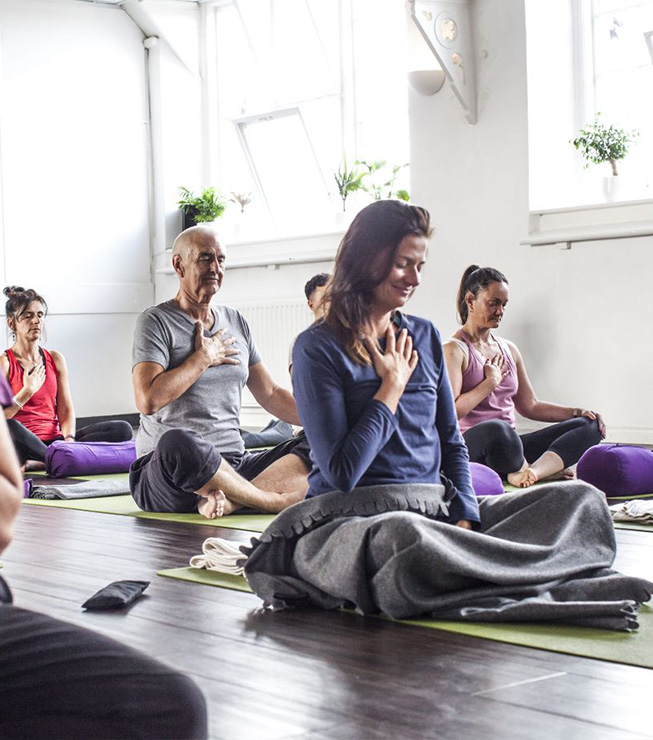Sorry if you are experiencing class booking issues. Whilst our engineers are fixing it please book via the Mindbody app or call us, or send an email.
Sorry if you are experiencing class booking issues. Whilst our engineers are fixing it please book via the Mindbody app or call us, or send an email.
The world is loud. In today’s environment there is a constant
bombardment on our senses and over time, this can take its toll leaving us
feeling tired, wired and overwhelmed. In
evolution terms, our nervous system isn’t yet prepared for this chronic and
ever-increasing level of stimulation, which is why more and more people are
discovering the benefits and power of silence.
When I look back at my journey with yoga and meditation, it’s those
precious moments of silence and stillness that have been the places I’ve felt
most content and at peace; the place I’ve felt most fully myself. I know most
people who practice regularly have felt the same. So why do we find it so hard
to switch off?
The answer I think is complicated. A combination of constant TV, music,
social media alerts, podcasts and YouTube videos have caused us to crave noise
and avoid silence. Behind this, there’s often a quiet avoidance lurking in the
background. When there’s nothing to distract us from our own thoughts — we
might have to pay attention to what we’re really thinking and feeling –
and that can sometimes seem scary. The paradox is, the more we run away from our
inner experiences, the worse that fear gets. Our thoughts and feelings become
the enemy and we can spend the rest of our lives (often doing some weird things!)
trying to avoid these at all cost.
YET. When we can learn to sit with these thoughts and feelings and
finally see that they’re just that – thoughts and feelings – their power diminishes,
and they turn from foe to friend. They become gentle signals for us to check in
with how we’re doing.
But this doesn’t come easily. There’s a process of ‘undoing’ needed to
disrupt those unhelpful mental habits of distraction, worry and rumination.
When we can learn to sit with these thoughts and feelings and finally see that they're just that - thoughts and feelings - their power diminishes, and they turn from foe to friend.

It gets a little better with practice
If silence is something you rarely get or even fear it a little, then leaning
towards it in daily activities can help you practice. Try a yoga or meditation
class. Listening to nature radio. Drive with the radio off. Sit on your deck or
porch in the morning and take in the quiet and stillness. When you go to bed,
use the silence to get calm or listen to it raining outside. Letting silence
help you wander through happy memories or list what we’re grateful for in your
life right now.
Then once we’ve touched into and feel comfortable with the quiet, we can
start to make the practice more intentional. The more we do this, the more
familiar it becomes and eventually – instead of silence and stillness being a
place to fear or avoid, it becomes an inner sanctuary; a place for us to rest
and feel peaceful without needing anything else or anyone else to make this
happen.
The first time I experienced this in a really deep way was during a
1-day silent retreat. Just spending a few hours without any demands on my time
and energy, or any distractions was bliss. The teacher skilfully led different
meditation practices throughout the day so that we could stay present, and by
the end of the day I felt joyful!
Taking time out to do nothing can seem so…..well, pointless and a waste
of time in our culture. We value productivity and To Do lists and pictures on
social media showing the world how brilliant our lives are (while often feeling
low and overwhelmed). But taking the time for silence sends yourself the
message that you are worth hearing (deeply) and giving yourself this time and
space is a gorgeous act of self-love.
I’ve now made silence a priority in my life. I practice seated
meditation every morning and go on a Silent Retreat once or twice a year. Of
course, by the time to retreat rolls around, it always feels like the worst
possible time for me to leave my business for seven days, completely unplugged.
The needs of the studio demand my full attention — or at least that was the
story I have in my head.
In reality, taking this time to go on the retreat is the best thing I
can do for myself and my business. It gives me the space and clarity to make
the best decisions for the health and longevity of the company, and for me and
the team, which ultimately improves the lives of those around us. I had no
expectations going into the retreat, but I came out of the experience with new
depths of clarity and the ability to be more present. It was impactful enough
that I decided to make a 7 or 10-day silent retreat a biannual occurrence. It’s
my way of ensuring that I’m in the right state of mind so I can be a better
person to those around me — whether it’s my team members, my family, friends or
any human being I encounter throughout the day.

1. Improve Your Focus on the Present Moment
A silent retreat is a unique time for you. It’s a time to turn all distractions off — there is no talking, reading, writing, or phone. When doing this, we come back to being fully aware, in the moment, right here, right now. When we can let go of future worries and past resentments, there’s a delicious reprieve from the noise in our heads.
2. Clear Your Mind
The structure of a silent retreat allows for my mind to deepen in a way that it isn’t able to elsewhere. A few hours in, a clarity of mind begins to take place — it’s as if my mind is recovering from running a marathon and starting to feel strong again. After a retreat, I can approach any business and personal challenges that have been occupying my mind with greater clarity.
A favourite quote of mine comes from Holocaust survivor Viktor Frankl: “Between stimulus and response there is a space. In that space is our power to choose our response. In our response lies our growth and our freedom.”
If you already have a daily meditation practice, you probably recognise what Frankl is describing. When you commit to an extended retreat, the results are multiplied.
3. Keep Perspective
I have the stories of my life playing in my head constantly: the events of the past day, week, and month keep my mind busy. The stillness of a retreat (no talking, no phones, no distractions!) allows for me to begin noticing and hearing things differently. Ultimately, this results in helping me to be less reactive and more positive.
Our minds are busy, and it’s more urgent than ever that we intentionally find ways to focus our attention by taking time away from all the doing in our lives. If you’re interested in learning more about what it’s like to attend a silent meditation retreat, check out our upcoming workshop, or perhaps regular classes.
